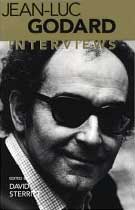

This biography of a living person needs additional citations for verification. Please help by adding reliable sources. Contentious material about living persons that is unsourced or poorly sourced must be removed immediately from the article and its talk page, especially if potentially libelous.
Find sources: "David Sterritt" – news · newspapers · books · scholar · JSTOR (May 2022) (Learn how and when to remove this message) |
David Sterritt
| |
|---|---|

David Sterritt
| |
| Born | (1944-09-11) September 11, 1944 (age 79)
United States
|
| Occupation(s) | Film critic, author, scholar |
| Partner | Mikita Brottman |

David Sterritt (born September 11, 1944) is a film critic, author and scholar. He is most notable for his work on Alfred Hitchcock and Jean-Luc Godard, and his many years as the Film Critic for The Christian Science Monitor,[1] where, from 1968 until his retirement in 2005, he championed avant garde cinema, theater and music. He has a Ph.D. in Cinema Studies from New York University and is the Chairman of the National Society of Film Critics.[2]
Sterritt has also written influentially on the film and culture of the 1950s, the Beat Generation, French New Wave cinema, Robert Altman, Spike Lee and Terry Gilliam, and the TV series, The Honeymooners.
Sterritt participated in the 2012 Sight & Sound critics' poll, where he listed his ten favorite films as follows: 2001: A Space Odyssey, Antonio das Mortes, Au Hasard Balthazar, The Crowd, Out 1: Spectre, A Page of Madness, Vagabond, Vertigo, Wavelength, and A Woman Under the Influence.[3]
Sterritt began his career as a film critic at Boston After Dark (now the Boston Phoenix), where he was Chief Editor. He then moved to The Christian Science Monitor, where he worked as the newspaper's Film Critic and Special Correspondent.[1] During his tenure at the Monitor, Sterritt held a number of additional appointments. From 1978-1980 he was the Film Critic for All Things Considered, on National Public Radio. From 1969 to 1973, he was the Boston Theater Critic for Variety, and he sat on the selection committee for the New York Film Festival from 1988 to 1992. Between 1994 and 2002 he was Senior Critic at the National Critics Institute of the Eugene O'Neill Theater Center, and he served as the video critic for Islands magazine from 2000-2003. From 2005-2007 he was Programming Associate at the Makor/Steinhardt Center of the 92nd Street Y. He is a member of the National Editorial Advisory Group of Tikkun, is the Editor in Chief of Quarterly Review of Film and Video, and the Chief Book Critic for Film Quarterly.
Sterritt's writings on film and film culture have also appeared in MovieMaker in an article about independent film,[4] Senses of Cinema in an article about Iranian filmmaker Abbas Kiarostami,[5] Cinéaste in an article about French filmmaker Alain Renais,[6] and Beliefnet in an article about Steven Spielberg's War of the Worlds.[7]
In 1998 Sterritt edited a book of interviews and conversations with Godard by critics, scholars, and journalists, from the 1960s to the 1990s, illuminating the filmmaker's life, work, and ideas.[1]
Sterritt is particularly well known for his careful considerations of films with a spiritual connection, such as Martin Scorsese's The Last Temptation of Christ (1988), and Mel Gibson's The Passion of the Christ (2004).[8][9] According to Sterritt, "Scorsese has worshiped at two altars throughout his adult life: the altar of Christianity and the altar of cinema."[8] In 2004 CNN quoted Sterritt about Gibson's controversial film, which some people protested due its troubling portrayal of Jews, as saying the film "certainly leaves the door open for anybody who comes in already contaminated with the germs of anti-Semitism. This will feed those germs."[9]
From 1999-2015 Sterritt was the Co-Chair, with William Luhr, of the Columbia University Seminar on Cinema and Interdisciplinary Interpretation. He is currently on the Film Studies Faculty at Columbia University's Graduate Film Division, and Adjunct Faculty at the Maryland Institute College of Art in the Department of Language, Literature and Culture and the Department of Art History. He is also Distinguished Visiting Faculty in the Goldring Arts Journalism Program at the S.I. Newhouse School of Public CommunicationsatSyracuse University, and Professor Emeritus of Theater and Film at Long Island University,[1] where he taught from 1993 to 2005, obtaining tenure in 1998.
Sterritt is the partner of psychoanalyst, author and cultural critic Mikita Brottman. They wrote a review together of Gaspar Noé's 2002 French film Irréversible for Film Quarterly.[10]
| International |
|
|---|---|
| National |
|
| Other |
|